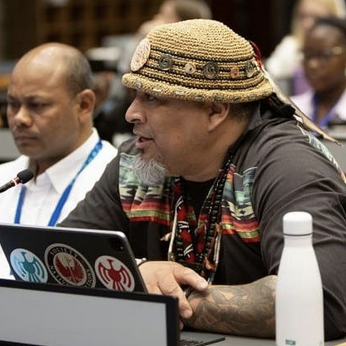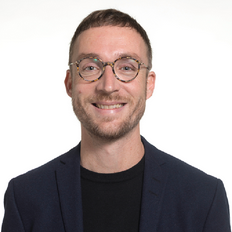Se proporcionó interpretación al español para este seminario web; véase la descripción en español más abajo.
Plastic pollution and overproduction of chemicals and plastics is a growing global crisis, with devastating harm to the environment, human health, human rights, biodiversity, and the climate.
At the end of November, delegates from around the world will convene in Busan, South Korea for the fifth session of the Intergovernmental Negotiating Committee (INC-5) to draft a global, legally binding treaty on plastics. This is the final scheduled negotiating session before the adoption of the treaty's final text, expected in early 2025.
Concerns are rising among Indigenous Peoples, frontline communities, scientists, and other representatives of civil society about the involvement of the fossil fuel and chemical industries, whose interests are in direct conflict with treaty objectives. An analysis of INC-4 participants based on the United Nations Environment Programme's (UNEP) provisional list found a 37% increase in industry lobbyists at INC-4 compared to INC-3, with fossil fuel and chemical industry lobbyists outnumbering the combined 180 representatives of the European Union delegations.
The tensions between corporate interests and the treaty’s objectives are clear. An open letter from Greenpeace, signed by over 170 civil society organizations and scientists, urges UNEP and the INC to adopt a strong conflict of interest policy to protect the treaty from industry influence. While lobbyists appear on country delegations and gain access to Member State-only sessions, Indigenous Peoples representatives and nongovernmental organizations are not granted access to these sessions and are given limited time to speak.
This webinar explored who has had a “seat at the table” during the course of plastic treaty negotiations, and highlighted the need to prioritize the voices of frontline communities, Indigenous Peoples, and independent scientists.
Frankie Orona, Executive Director of the Society of Native Nations, will discuss representation of Indigenous Peoples throughout the negotiating process. Yuyun Ismawati, co-chair of IPEN and co-founder and Senior Advisor of the Nexus3 Foundation, will focus on representation of impacted communities who live on the frontlines of plastic pollution, especially in the Global South. And Dr. Martin Wagner, Associate Professor for environmental toxicology at the Norwegian University for Science and Technology and member of the Scientists' Coalition, will discuss petrochemical industry influence and challenges faced by independent scientists.
Spanish interpretation was provided for this webinar.
Negociaciones sobre el Tratado Mundial sobre el Plástico: ¿Quién tiene un sitio en la mesa?
La contaminación por plásticos y la sobreproducción de sustancias químicas y plásticos es una crisis mundial creciente, con daños devastadores para el medio ambiente, la salud humana, derechos humanos, biodiversidad y el clima.
A finales de noviembre, delegados de todo el mundo se reunirán en Busan (Corea del Sur) en la quinta sesión del Comité Intergubernamental de Negociación (INC-5, por sus siglas en inglés) para redactar un tratado mundial legalmente vinculante sobre los plásticos. Esta es la última sesión de negociación programada antes de la aprobación del texto final del tratado, prevista para principios de 2025.
Sigue aumentando la preocupación entre las comunidades indígenas, comunidades de primera línea, científicos y otros representantes de la sociedad civil por la participación de las industrias químicas y de combustibles fósiles, cuyos intereses entran en conflicto directo con los objetivos del tratado. Un análisis de los participantes en INC-4 basado en la lista provisional del UNEP reveló un aumento del 37% de los cabilderos de la industria en INC-4 en comparación con INC-3, con cabilderos de la industria química y de combustibles fósiles que superaban en número a los 180 representantes combinados de las delegaciones de la Unión Europea.
Las tensiones entre los intereses empresariales y los objetivos del tratado son evidentes. Una carta abierta de Greenpeace, firmada por más de 170 organizaciones de la sociedad civil y científicos, le pide al UNEP e INC a adoptar una política firme en cuanto al conflicto de intereses para proteger el tratado de la influencia de la industria. Mientras que los cabilderos aparecen en las delegaciones de los países y tienen acceso a las sesiones reservadas para los Estados miembros, representantes de los pueblos indígenas y organizaciones no gubernamentales no tienen acceso a estas sesiones y disponen de un tiempo limitado para tomar la palabra.
En este seminario web, se analizó quién ha tenido un "sitio en la mesa" durante el transcurso de las negociaciones de los tratados sobre plásticos y se destacó la necesidad de dar prioridad a las voces de las comunidades de primera línea, poblaciones indígenas y científicos independientes.
Frankie Orona, director ejecutivo de la Sociedad de Naciones Nativas, hablará de la representación de las personas indígenas en todo el proceso de negociación. Yuyun Ismawati, copresidenta de IPEN y cofundadora y consejera sénior de la Fundación Nexus3, se centrará en la representación de las comunidades afectadas que viven en la primera línea de la contaminación por plásticos, especialmente en el Sur Global. Y el Dr. Martin Wagner, profesor asociado de Toxicología Ambiental en la Universidad Noruega de Ciencia y Tecnología y miembro de la Coalición de Científicos, hablará de la influencia de la industria petroquímica y los retos a los que se enfrentan los científicos independientes.
Featured Speakers

Frankie Orona (Borrado/Tongva/Chumash) is a Husband of 23 Years, a proud Father, and Executive Director of the Society of Native Nations, an intertribal nonprofit dedicated to preserving Indigenous spirituality, culture, and way of life. As an environmental liaison for his Tribal Chief, Anthony Morales of the Gabrielino/Tongva San Gabriel Band of Mission Indians, he tirelessly advocates for environmental justice and the rights of Indigenous peoples. Frankie serves on numerous environmental coalition steering committees and nonprofit boards. As a member of a U.S. Environmental Justice Delegation and the Indigenous Peoples Major Group with UNEP, he actively works on the Global Plastics Treaty and other UN frameworks addressing environmental concerns. His mission is to remind us that we are not separate from the environment but rather an integral part of it and that the health of both are inextricably linked. For over 25 years, he has championed Mother Earth, building relationships and bridges between cultures and helping to advocate for the Rights of Indigenous Peoples and ancestral wisdom. He firmly believes that education, collaboration, and understanding are the cornerstones of a sustainable future for all. Through global initiatives and unwavering dedication, he strives to empower communities and protect our planet's precious gifts that many call "resources." Together, we can help bring about positive global change for all future generations.

Martin Wagner, PhD, is an Associate Professor for environmental toxicology at the Norwegian University for Science and Technology (NTNU) in Trondheim. His main research interest is in the impacts of plastic pollution and plastic chemicals on nature and human health. To study this, he works at the interface of ecology, toxicology, and chemistry combining in vitro, in vivo, and mass spectrometry approaches. As an expert on the societal and environmental impacts of plastics, he is consulting high-level policymakers (United Nations, European Commission) and is frequently featured by international media. In 2013, Dr. Wagner received his PhD degree from the Goethe University Frankfurt am Main for his research on endocrine disrupting chemicals in plastic food packaging. Then, Dr. Wagner became head of the Bioanalytical Toxicology group at Goethe University, which focused on water quality assessment as well as on freshwater microplastics. Since 2017, Dr. Wagner has continued his research into endocrine disrupting chemicals and plastic pollution at NTNU Trondheim. More information: www.biotox.de.

Yuyun Ismawati is a dedicated Indonesian national with over thirty years of work in advocacy for environmental health and for strong policies on chemicals and waste. She is a co-founder and Senior Advisor of the Nexus3 Foundation, the leading Indonesian public interest organization working to protect people, especially vulnerable populations, from the impacts of development on public health and the environment, towards a future of justice and toxics-free, sustainable living. Her career has been characterized by her insightful and passionate drive to address critical environmental challenges through collaborative approaches and innovative solutions that lead to policy changes. In 2009, she received the prestigious Goldman Environmental Prize for her groundbreaking work on reducing pollution and waste, and she is also an Ashoka Fellow and a Leadership for Environment and Development (LEAD) Fellow
 This event was co-hosted by CHE and CHE-Alaska, which is coordinated by Alaska Community Action on Toxics (ACAT). Driven by a core belief in environmental justice, ACAT empowers communities to eliminate exposure to toxics through collaborative research, shared science, education, organizing, and advocacy.
This event was co-hosted by CHE and CHE-Alaska, which is coordinated by Alaska Community Action on Toxics (ACAT). Driven by a core belief in environmental justice, ACAT empowers communities to eliminate exposure to toxics through collaborative research, shared science, education, organizing, and advocacy.
Este evento fue organizado conjuntamente por CHE y CHE-Alaska, coordinado por la Acción Comunitaria de Alaska contra los Productos Tóxicos (ACAT, por sus siglas en inglés). Impulsada por una creencia fundamental en la justicia ambiental, ACAT capacita a las comunidades para eliminar la exposición a tóxicos a través de la investigación colaborativa, ciencia compartida, educación, organización y defensoría.
